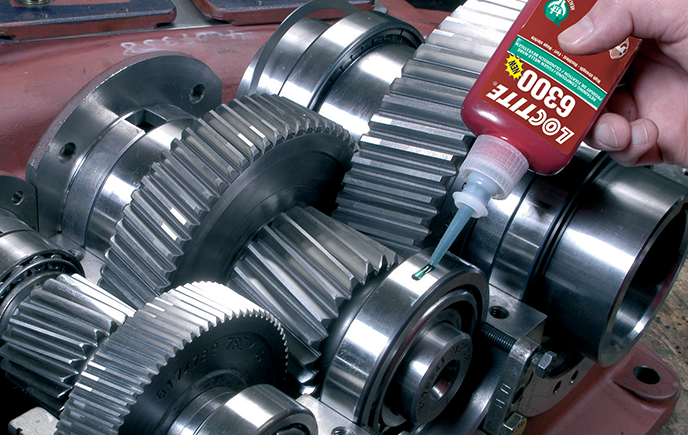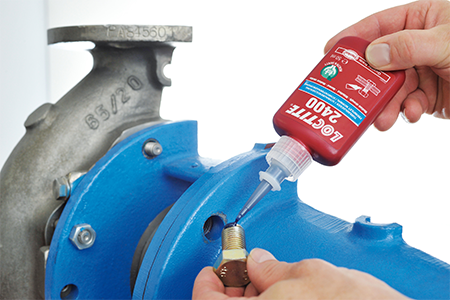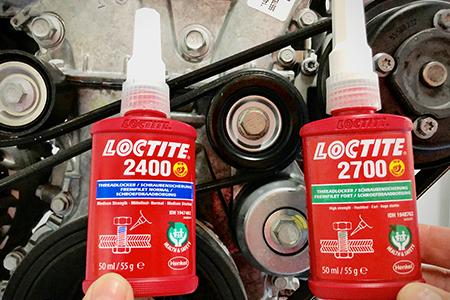In this article
Loctite test the water with WRAS-approved adhesives
There are strict rules and regulations surrounding the use of adhesives such as threadlockers and sealants for products that are likely to convey or regulate public drinking water. Failure to check that an adhesive complies with the necessary standards can lead to disastrous consequences. Health, costs, and brand reputation are on the line. So, our advice to you is, check carefully before making your purchase.

The Water Regulations Advisory Scheme (WRAS) is a conformance mark which demonstrates that an item complies with the high standards outlined by UK water regulations. In short, no material or substance which causes, or is likely to cause, the contamination of water shall be used in the construction, installation, renewal, repair or replacement of any water fitting that conveys or received water supplied for domestic purposes. To make that clear, that includes drinking, bathing, washing or cooking.
Only materials which have satisfied the requirements of BS 692:2000 Parts 1 and 2 shall receive WRAS Material Approval, with anything from pipes, fittings, valves, pumps, taps, showers, washing machines and dishwasher, to coffee machines, boilers and toilets, must comply.
The challenge
Non-metallic materials such as threadlocking adhesives and sealants are today commonplace in a variety of different products and assemblies for domestic water supplies. However, some non-metallic materials can affect the odour, flavour or colour of water, with further potential issues such as the release of soluble organic chemicals or the promotion of micro-organisms a cause for concern.
BS 6920:2000 – ‘Suitability of non-metallic products for use in contact with water intended for human consumption with regard to their effect on the quality of water’ – outlines the test methods and criteria observed by WRAS when assessing no-metallic materials.

The tests in BS 6920 reproduce the typical conditions that a material might meet during its service life in contact with wholesome water.
Receiving WRAS approval declares that the product is of a suitable quality and standard to avoid water contamination and minimise waste, but only if applied correctly.
Testing, testing, testing
So, now we’re guessing you want to know what the tests involve? Well, odour and flavour testing are fairly self-explanatory. A panel of experts assess the taste and smell against a control of tap water. Colour is examined using a colour spectrum, while turbidity (a measure of the degree to which the water loses its transparency) is tested using a turbidimeter, with pre-determined pass/fail criteria applying to both instances.
Microbial testing reveals if a product will promote any significant growth of aerobic micro-organisms. MDOD (mean dissolved oxygen difference) then determines the pass or fail criteria over the duration of the test, which typically takes 7-10 weeks.

The removal of oxygen from the test system occurs as aerobic-organisms increase, with comparisons drawn between this loss and the control system.
MDOD is the mean value from samples taken at different stages of the testing process, with final evaluation concluding in a pass or fail.
Cytotoxicity testing is also required, with a typical duration of seven days. Throughout this period, the analysis team will look for a cytotoxic response or, in other words, determine whether a product shows any toxicity levels to humans.
Don’t let quality corrode away
When it comes to drinking water, protection against corrosion over a products lifecycle is the prerequisite for avoiding contamination. Taking this stance, many of the latest WRAS-approved threadlocking adhesives are designed with patented cure chemistry that optimises performance on anti-corrosion, zinc-flake coated fasteners, and passive substrates such as stainless steel and zinc dichromate.
Zinc-flake coated fasteners are today becoming a common choice over zinc-plated and chromed-based alternatives, as they are more resistant to corrosion, safer to manufacture, and do no carry the risk of hydrogen embrittlement. The newest WRAS-approved adhesives can also lock and seal brass fittings in drinking water applications.
Quality is key here. It’s that simple. Inferior adhesives can become brittle after the curing process, resulting in the seal breaking or fracturing if the plumber accidently drops the fitting or throws it into a storge box. In addition to WRAS approval, a successful adhesive for this particular application will absorb shock after curing, providing a durable resultant bond, and be supplied hazard label free.
Stamp of approval
Once approved, selected adhesives and sealants can carry the ‘WRAS Approved’ logo on their packaging. But we should make you aware that, not all products brandish the logo as it is not a requirement. To be certain, we advised to check the approval directory on the WRAS website, or even ask the manufacturer, merchant, or retailer. Remember, you can never be too sure.
In conclusion, there should be no compromise on safety when it comes to drinking water applications. That really is the bottom line. But by choosing the LOCTITE® range of WRAS-approved threadlockers and sealants, you can rest assured that optimum safety has been considered for both plumbers and consumers.
Shop the full range of Loctite products we offer here. Alternatively feel free to contact your local ERIKS Service Centre, who will be more than happy to assist you.
#ERIKS #LetsMakeIndustryWorkBetter #Loctite #WRAS #Approved #Safety #Regulations #Adhesives

